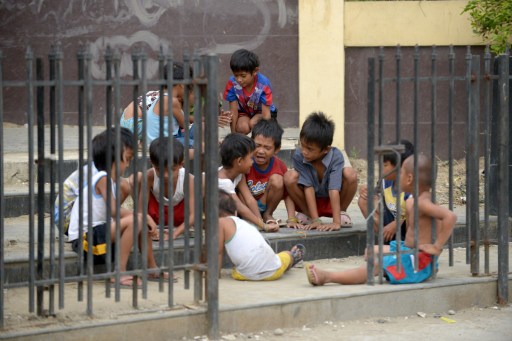
This photo taken April 8, 2014, shows children in a slum playing in the dirt even as many of their mothers cite the need for greater help in family planning to control the size of their families. AFP FILE PHOTO / Jay DIRECTO / AFP PHOTO / JAY DIRECTO
MANILA, Philippines — With the development of vaccines and the gradual slowing down of the COVID-19 pandemic, the Commission on Population and Development (PopCom) is looking forward to 2021 as it admits the health crisis has affected the national family planning program.
According to Undersecretary Juan Antonio Perez III, PopCom’s executive director, the agency tasked to implement Republic Act No. 10354 or the Responsible Parenthood and Reproductive Health (RPRH) Law is gearing for the incoming year as it looks to recover from the set back caused by COVID-19 on its enforcement of modern family planning methods in the country.
Perez said in his message for the 2020 State of Population and Development report on Thursday that there is a need to recover from the low performance of the National Program on Population and Family Planning (NPPFP) — despite official numbers not yet coming out.
“At the start of 2020, I recognize that everyone has been enthusiastically carrying on what we have started for the NPPFP […] That enthusiasm, however, was overtaken by anxiety, fear, and doubt brought by the spread of the pandemic being borne heavily not only by Filipinos but also the rest of humanity,” Perez told the audience.
“Our new aspirations will commence once we take the initial steps toward 2021. Needless to say, we need to recover from a possibly low performance of the NPPFP because of COVID-19,” he added.
PopCom has been active from the start of the year, even enthusiastic with the agency leading campaigns against early and teenage pregnancy by hopping from one train station to another last February 14 — Valentine’s Day — to remind students of the importance of education.
Perez himself said they have created cheesy but catchy taglines to forewarn students on the perils of early pregnancy, which is believed to have long-lasting effects.
READ: PopCom exec wants giving contraceptives to minors with kids restored in law
However, after many areas in the country were placed on lockdown to minimize possible new coronavirus transmissions, PopCom found it hard to provide those into family planning the tools or assistance they needed.
PopCom estimated that around 2 million babies would be born in 2020, of which 214,000 are unplanned and were due to couples having more time together during the lockdown. Along with these estimates were fears of a surge in domestic violence and poor maternal health, as the country focuses on the pandemic.
READ: COVID-19 lockdown as aphrodisiac? Couples asked to avoid unplanned pregnancy
And just when the country was finally gaining ground against the pandemic, a series of typhoons forced people into evacuation sites — another possible problem for reproductive health.
“The fight versus an unseen enemy still pervades; the calamities—both natural and man-made—have brought untold damage and suffering with the loss of countless lives. All these have posed a challenge to us: to rise above, act and follow through what we have started for the sake of our fellowmen,” Perez said.
READ: Lockdown babies: Gatchalian warns of spike in teenage pregnancies in typhoon-hit areas
Despite these problems, Perez claimed that the country, plus the government’s family planning push, will bounce back in 2021.
“Come 2021, I believe each of us will carry renewed strength and unwavering vitality, ready to bring benefits to our fellowmen—regardless of their standing in society—as well as cheer to every Filipino individual and family,” he said.
“Pandemic, calamities, or any obstacle to our program notwithstanding, I believe we can bounce back from the travails we face in life. Because only through our common cadence toward a single direction can we channel each other’s strengths, with the conviction that we will all be united, no matter what happens,” he added.

